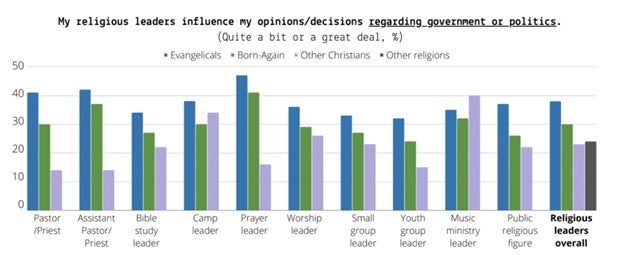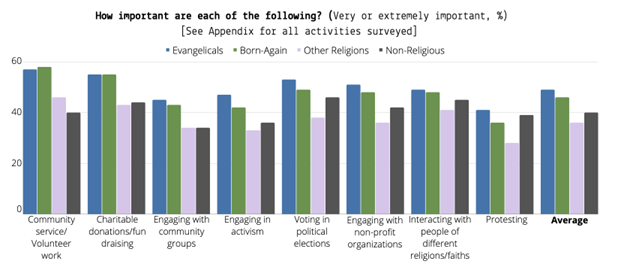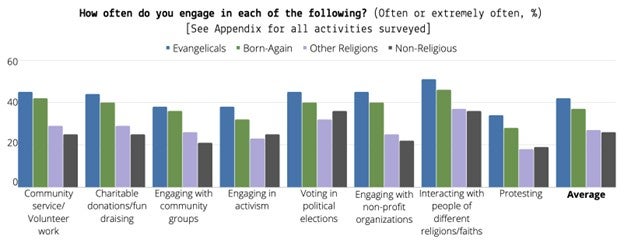As Americans become more divided across racial, religious, and political lines, finding ways to bring people together is increasingly important. It can be tempting to believe that younger generations will champion pluralism and heal America’s divisions. However, recent data on Gen Z paints a more complex picture.
Gen Z is enthusiastic about pluralism, but that isn’t necessarily translating into action. A 2020 study by the Interfaith Youth Core asked 7,000 students at 122 colleges about their interfaith engagement. Only 14% of respondents participated in a related interfaith activity at college, despite 70% of seniors indicating a commitment to bridging religious divides.
Religion scholar Ken Chitwood calls this the “apathy gap”—Gen Z’s enthusiasm for pluralism is overshadowed by indifference to act on it. But this isn’t necessarily surprising; Many young people aren’t sure how to live out their ideals, and others lack the opportunity to do so.
As the director of Neighborly Faith, a nonprofit that trains Evangelical students to lead across faith lines, this is a problem we are working to address. In recent years, new data has helped us (and partners like us, including the Aspen Institute’s Religion & Society Program) understand how to bridge the apathy gap to engage Gen Z in pluralism work.
One reason Gen Z may be opting out of pluralism activities may be that they aren’t connecting with how programs are advertised. Most Gen Zs do not like or understand the jargon used in the pluralism field—or even the word “pluralism.” A 2021 study by Philanthropy for Active Civic Engagement found that among young adults (ages 18-35), a larger share view this word negatively (39%) than positively (33%). The remainder (28%) are ambivalent or don’t know what it means.
Gen Z had similar feelings about many of the words used most often in our field: common good (just 27% viewed it positively), common ground (23%), bridge builder (24%), unity (23%), and civic engagement (28%). Most young Americans respond with negativity, ambivalence, or confusion when these words are used.
Neighborly Faith has seen strong responses from Gen Z students when we use much simpler language. For example, on one Christian college campus we advertised, “Come Eat a Delicious Dinner with Local Muslim Students,” and were surprised with the turnout. Many students who participated had never done a pluralism-related activity but found the straightforward invitation compelling.
Another promising way to get Gen Z involved in pluralism work is to recruit them through their religious leaders. A new study by Neighborly Faith and Springtide Research Institute found that these leaders shape students’ “community engagement” and “opinions about political issues” more than professors, employers, political leaders, and even teachers. Our surveys of 2,000 Gen Z students discovered that religious leaders are the most influential for all groups except the non-religious.
Gen Z respondents also reported that a surprising variety of religious leaders influenced their social, spiritual, and personal lives. They ranked leaders like camp counselors, small group leaders, music ministry leaders, public religious figures, and (for Evangelical Christians in particular) prayer leaders similar to formal religious leaders like pastors and priests. These lay or informal leaders are often overlooked as partners for recruiting young adults to pluralism activities. They may be the best candidates.
In our work at Christian colleges, we’ve learned this firsthand. Busy professors, influential admins, and even college presidents aren’t always the most effective partners for getting strong student participation. Assistant chaplains and student ministry leaders who directly mentor students are typically more successful. More than others, these leaders can muster a volunteer force or convince dozens of students to attend an event for the first time.

One final way to get Gen Z more involved in pluralism work is to target groups most willing to participate. This may be especially helpful for new programs that need some initial uptake from Gen Z to get rolling. Energetic early adopters are a great way to get the word out about an exciting pluralism initiative or event. Yet, who to target is not always clear to nonprofits or educators.
In our 2022 study, we found that Evangelicals were by far the most civically engaged members of Gen Z—including when it comes to interfaith activities. With few exceptions, those in Gen Z identifying as “Evangelicals” and “born-again Christians” outranked their peers in their enthusiasm for a range of civic engagement activities and how often they participated in pluralism or civic engagement activities.


Although Evangelicals have a poor reputation for pluralism, I’ve seen first-hand that unlocking their enthusiasm can spark broader change. Consider Carissa Zaffiro’s outstanding student leadership at Taylor University as a Neighborly Faith fellow. Although she had little background in pluralism in her Evangelical upbringing, she learned to connect her passionate faith to pluralism work. Carissa planned her college’s first “World Religions Week,” which introduced hundreds of students to pluralism, and took her church in rural Indiana to visit a mosque for the first time. In an essay in Sojourners, Carissa explains that her deep faith was not a barrier to interfaith engagement. Instead, it helped her to see that people of other faiths “are image bearers of the same God.”
Many more members of Gen Z, like Carissa, are enthusiastic about making America more welcoming to everyone. Nonprofits, philanthropists, and educators can help them connect this passion to engagement and leadership. A good start may be advertising pluralism programs in terms Gen Z understands, connecting with them through their religious leaders, and targeting enthusiastic early adopters.
These strategies can go a long way to bridge the apathy gap and connect Gen Z’s passion for pluralism with real opportunities to make America a more welcoming place for everyone.
Chris Stackaruk is the director of Neighborly Faith, where he designs new programs to connect Evangelical students’ faith to pluralism and civic engagement.


